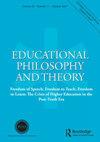性还是头?通过Hélène Cixous的作品,女性的声音和学术女性
IF 1.8
4区 教育学
Q2 EDUCATION & EDUCATIONAL RESEARCH
引用次数: 1
摘要
本文章由计算机程序翻译,如有差异,请以英文原文为准。
The sex or the head? Feminine voices and academic women through the work of Hélène Cixous
Abstract Hélène Cixous is perhaps best known for her paper, ‘The Laugh of the Medusa’ (1976) and her literary contributions outside academia. In this paper, we pick up a lesser known Cixous text, ‘Le Sexe ou la tête?’ that offers an interesting and provocative perspective on the traps associated with being feminine in a masculine environment. As we converse with Cixous, weaving our own words and experiences with hers, we link her work more closely with the feminine in modern-day academia. We suggest that Cixous’s remarks on decapitation and voice offer a way forward for academic women to be; to speak; to recognise the double jeopardy of decapitation in the university; and to use laughter as a strategic, powerful, political act of resistance and subversion against oppressive masculine power structures. We draw on and seek to enact Cixous’s notion of écriture feminine—a disruptive style of writing that provides a mode of being, speaking, and writing that subverts the power of masculine norms in order to be heard and to bring possibilities for change.
求助全文
通过发布文献求助,成功后即可免费获取论文全文。
去求助
来源期刊

Educational Philosophy and Theory
EDUCATION & EDUCATIONAL RESEARCH-
CiteScore
4.20
自引率
15.00%
发文量
171
期刊介绍:
Educational Philosophy and Theory publishes articles concerned with all aspects of educational philosophy. It will also consider manuscripts from other areas of pure or applied educational research. In this latter category the journal has published manuscripts concerned with curriculum theory, educational administration, the politics of education, educational history, educational policy, and higher education. As part of the journal''s commitment to extending the dialogues of educational philosophy to the profession and education''s several disciplines, it encourages the submission of manuscripts from collateral areas of study in education, the arts, and sciences, as well as from professional educators. Nevertheless, manuscripts must be germane to the ongoing conversations and dialogues of educational philosophy.
 求助内容:
求助内容: 应助结果提醒方式:
应助结果提醒方式:


